- Home
- Steven Pressfield
Gates of Fire
Gates of Fire Read online
Gates of Fire
An Epic Novel of the Battle of Thermopylae
Steven Pressfield
ISBN: 0553580531
Pub. Date: August 1999
Content
Historical Note
Quote
Book One Xerxes
Chapter One
Chapter Two
Chapter Three
Chapter Four
Chapter Five
Chapter Six
Chapter Seven
Book Two Alexandros
Chapter Eight
Chapter Nine
Chapter Ten
Chapter Eleven
Book Three Rooster
Chapter Twelve
Chapter Thirteen
Chapter Fourteen
Book Four Arete
Chapter Fifteen
Chapter Sixteen
Chapter Seventeen
Book Five Polynikes
Chapter Eighteen
Chapter Nineteen
Chapter Twenty
Chapter Twenty One
Chapter Twenty Two
Chapter Twenty Three
Book Six Dienekes
Chapter Twenty Four
Chapter Twenty Five
Chapter Twenty Six
Chapter Twenty Seven
Chapter Twenty Eight
Chapter Twenty Nine
Book Seven Leonidas
Chapter Chapter Thirty
Chapter Thirty One
Chapter Thirty Two
Chapter Thirty Three
Book Eight Thermopylae
Chapter Thirty Five
Chapter Thirty Six
Chapter Thirty Seven
Chapter Thirty Eight
Acknowledgments
About The Author
Historical Note
In 480 B.C. the forces of the Persian Empire under King Xerxes, numbering according to Herodotus two million men, bridged the Hellespont and marched in their myriads to invade and enslave Greece.
In a desperate delaying action, a picked force of three hundred Spartans was dispatched to the pass of Thermopylae, where the confines between mountains and sea were so narrow that the Persian multitudes and their cavalry would be at least partially neutralized. Here, it was hoped, an elite force willing to sacrifice their lives could keep back, at least for a few days, the invading millions.
Three hundred Spartans and their allies held off the invaders for seven days, until, their weapons smashed and broken from the slaughter, they fought with bare hands and teeth (as recorded by Herodotus) before being at last overwhelmed.
The Spartans and their Thespian allies died to the last man, but the standard of valor they set by their sacrifice inspired the Greeks to rally and, in that fall and spring, defeat the Persians at Salamis and Plataea and preserve the beginnings of Western democracy and freedom from perishing in the cradle.
Two memorials remain today at Thermopylae. Upon the modem one, called the Leonidas Monument in honor of the Spartan king who fell there, is engraved his response to Xerxes' demand that the Spartans lay down their arms. Leonidas' reply was two words, Molon labe.
Come and get them.
The second monument, the ancient one, is an unadorned stone engraved with the words of the poet Simonides. Its verses comprise perhaps the most famous of all warrior epitaphs:
Go tell the Spartans, stranger passing by, that here obedient to their laws we lie.
Although extraordinary valor was displayed by the entire corps of Spartans and Thespians, yet bravest of all was declared the Spartan Dienekes. It is said that on the eve of battle, he was told by a native of Trachis that the Persian archers were so numerous that, when they fired their volleys, the mass of arrows blocked out the sun. Dienekes, however, quite undaunted by this prospect, remarked with a laugh, Good. Then we'll have our battle in the shade. -
HERODOTUS, THE HISTORIES
Quote
The fox knows many tricks; the hedgehog one good one,
- ARCHILOCHUS
Book One
Xerxes
BY ORDER OF HIS MAJESTY, Xerxes son of Darius, Great King of Persia and Media, King of Kings, King of the Lands; Master of Libya, Egypt, Arabia, Ethiopia, Babylonia, Chaldea, Phoenicia, Elam, Syria, Assyria and the nations of Palestine; Ruler of Ionia, Lydia, Phrygia, Armenia, Cilicia, Cappadocia, Thrace, Macedonia and the trans-Caucasus, Cyprus, Rhodes, Samos, Chios, Lesbos and the islands of the Aegean; Sovereign Lord of Parthia, Bactria, Caspia, Sousiana, Paphlagonia and India; Lord of all men from the rising to the setting sun, His Most Holy, Reverend and Exalted, Invincible, incorruptible, Blessed of God Ahura Mazda and Omnipotent among Mortals. Thus decreeth His Magnificence, as recorded by Gobartes the son of Artabazos, His historian;
That, following the glorious victory of His Majesty's forces over the arrayed Peloponnesian foe, Spartans and allies, at the pass of Thermopylae, having extinguished the enemy to the last man and erected trophies to this valorous conquest, yet was His Majesty in His God-inspired wisdom desirous of further intelligence, both of certain infantry tactics employed by the enemy which proved of some effect against His Majesty's troops, and of the type of foemen these were who, though unbound by liege law or servitude, facing insuperable odds and certain death, yet chose to remain at their stations, and perished therein to the final man.
His Majesty's regret having been expressed at the dearth of knowledge and insight upon these subjects, then did intercede God Ahura Mazda on His Majesty's behalf. A survivor of the Hellenes fas the Greeks call themselves) was discovered, grievously wounded and in a state of extremis, beneath the wheels of a battle waggon, being unseen theretofore due to the presence of numerous corpses of men, horses and beasts of transport being heaped upon the site. His Majesty's surgeons being summoned and charged under pain of death to spare no measure to preserve the captive's life, God yet granted His Majesty's desire. The Greek survived the night and the morning following. Within ten days the man had recovered speech and mental faculty and, though yet confined to a Utter and under direct care of the Royal Surgeon, was able not only at last to speak but to express his fervent desire to do so.
Several unorthodox aspects of the captive's armor and raiment were noted by the detaining officers. Beneath the man's battle helmet was found not the traditional felt cawl of the Spartan hop-lite, but the dogskin cap associated with the race of helots, the Lakedaemonian slave class, serfs of the land. In contrast inexplicable to His Majesty's officers, the prisoner's shield and armor were of the finest bronze, etched with rare Hibernian cobalt, while his helmet bore the transverse crest of a full Spartiate, an officer.
In preliminary interviews, the man's manner of speech proved to be a compound of the loftiest philosophical and literary language, indicative of a deep familiarity with the epics of the Hellenes, intermingled with the coarsest and most crude gutter argot, much of which was uninterpretable even to His Majesty's most knowledgeable translators. The Greek, however, willingly agreed to translate these himself, which he did, utilizing scraps of profane Aramaic and Persian which he claimed to have acquired during certain sea travels beyond Hellas. I, His Majesty's historian, seeking to preserve His Majesty's ears from the foul and often execrable language employed by the captive, sought to excise the offensive material before His Majesty was forced to endure hearing it. Vet did His Majesty in His God-inspired wisdom instruct His servant so to translate the man's speech as to render it in whatever tongue and idiom necessary to duplicate the precise effect in Greek. This have I attempted to do. I pray that His Majesty recall the charge He imparted and hold His servant blameless for those portions of the following transcription which will and must offend any civilised hearer.
Inscribed and submitted this sixteenth day of U
lulu, Fifth Year of His Majesty's Accession.
Chapter One
Third day of Tashritu, Fifth Year of His Majesty's Accession, south of the Lokrian border, the Army of the Empire having continued its advance unopposed into central Greece, establishing an encampment opposite the eastern fall of Mount Parnassus, the sum of whose watercourses, as numerous others before upon the march from Asia, failed and was drunk dry by the troops and horses. The following initial interview took place in His Majesty's campaign tent, three hours after sunset, the evening meal having been concluded and ail court business transacted. Field marshals, advisors, household guards, the Magi and secretaries being present, the detaining officers were instructed to produce the Greek. The captive was brought in upon a litter, eyes cloth-bound so as to dissanction sight of His Majesty. The Magus performed the incantation and purification, permitting the man to speak within the hearing of His Majesty. The prisoner was instructed not to speak directly toward the Royal Presence but to address himself to the officers of the household guard, the Immortals, stationed upon His Majesty's left.
The Greek was directed by Orontes, captain of the Immortals, to identify himself. He responded that his name was Xe-ones the son of Sfcamandridas of Astakos, a city in Akamania. The man Xeones stated that he wished jSrst to thank His Majesty for preserving his life and to express his gratitude for and admiration of the skill of the Royal Surgeon's staff. Speaking from his Utter, and yet struggling with weakness of breath from several as-yet-unhealed wounds of iKe lungs and thoracic organs, he offered the following disclaimer to His Majesty, stating that he was unfamiliar with the Persian style of discourse and further stood unfortunately lacking in the gifts of poesy and story-spinning. He declared that the tale he could tell would not be of generals or kings, for the political machinations of the great, he said, he was and had been in no position to observe. He could only relate the story as he himself had lived it and witnessed it, from the vantage of a youth and squire of the heavy infantry, a servant of the battle train. Perhaps, the captive declared, His Majesty would discover little of interest in this narrative of the ordinary warriors, the men m the line, as the prisoner expressed it.
His Majesty, responding through Orontes, Captain of the Immortals, asserted to the contrary that this was precisely the tale he wished most to hear. His Majesty was, He declared, already possessed of abundant intelligence of the intrigumgs of the great; what He desired most to hear was this, the infantryman's tale.
What kind of men were these Spartans, who in three days had slain before His Majesty's eyes no fewer than twenty thousand of His most valiant warriors' Who were these foemen, who had taken with them to the house of the dead ten, or as some reports said, as many as twenty for every one of their own fallen? What were they like as men? Whom did they love? What made them laugh.
His Majesty knew they feared death, as all men. By what philosophy did their minds embrace it?
Most to the point, His Majesty said, He wished to acquire a sense of the individuals themselves, the real flesh-and-blood men whom He had observed from above the battlefield, but only indistinctly, from a distance, as indistinguishable identities concealed within the blood- and gorebegrimed carapaces of their helmets and armor.
Beneath his cloth-bound eyes, the prisoner bowed and offered a prayer of thanksgiving to some one of his gods. The story His Majesty wished to hear, he asserted, was the one he could truly tell, and the one he most wished to.
It must of necessity be his own story, as well as that of the warriors he had known. Would His Majesty be patient with this.' Nor could the telling confine itself exclusively to the battle, but must proceed from events antecedent in time, for only in this light and from this perspective would the lives and actions of the warriors His Majesty observed at Thermopylae be given their true meaning and significance.
His Majesty, field marshals, generals and advisors being satisfied, the Greek was given a bowl of wme and honey for his thirst and asked to commence where he pleased, to tell the story in whatever manner he deemed appropriate. The man, Xeones, bowed once upon his litter and began:
I had always wondered what it felt like to die. There was an exercise we of the battle train practiced when we served as punching bags for the Spartan heavy infantry. It was called the Oak because we took our positions along a line of oaks at the edge of the plain of Otona, where the Spartiates and the Gentleman-Rankers ran their field exercises in fall and winter. We would line up ten deep with body-length wicker shields braced upon the earth and they would hit us, the shock troops, coming across the flat in line of battle, eight deep, at a walk, then a pace, then a trot and finally a dead run. The shock of their interleaved shields was meant to knock the breath out of you, and it did. It was like being hit by a mountain. Your knees, no matter how braced you held them, buckled like saplings before an earthshde; in an instant all courage fled our hearts; we were rooted up like dried stalks before the ploughman's blade.
That was how it felt to die. The weapon which slew me at Thermopylae was an Egyptian hoplite spear, driven in beneath the plexus of the rib cage. But the sensation was not what one would have anticipated, not being pierced but rather slammed, like we sparring fodder felt beneath the oaks.
I had imagined that the dead would be detached. Thatthey would look upon life with the eyes of objective wisdom. But the experience proved the opposite. Emotion ruled. It seemed nothing remained but emotion. My heart ached and broke as never it could on earth. Loss encompassed me with a searing, all-mastering pain. I saw my wife and children, my dear cousin Diomache, she whom I loved. I saw Skaman-dridas, my father, and Eunike, my mother, Bruxieus, Dekton and Suicide, names which mean nothing to His Majesty to hear, but which to me were dearer than life and now, dying, dearer still.
Away they flew. Away I flew from them.
I was keenly conscious of the comrades-in-arms who had fallen with me. A bond surpassing by a hundredfold that which I had known in life bound me to them. I felt a sense of inexpressible relief and realized that I had feared, more than death, separation from them. I apprehended that excruciating war survivor's torment, the sense of isolation and self-betrayal experienced by those who had elected to cling yet to breath when their comrades had let loose their grip.
That state which we call life was over.
I was dead.
And yet, titanic as was that sense of loss, there existed a keener one which I now experienced and felt my brothers-in-arms feeling with me. It was this.
That our story would perish with us.
That no one would ever know.
I cared not for myself, for my own selfish or vainglorious purposes, but for them. For Leonidas, for Alexandras and Polynikes, for Arete bereft by her hearth and, most of all, for Dienekes. That his valor, his wit, his private thoughts that I alone was privileged to share, that these and all that he and his companions had achieved and suffered would simply vanish, drift away like smoke from a woodland fire, this was unbearable.
We had reached the river now. We could hear with ears that were no longer ears and see with eyes that were no longer eyes the stream of Lethe and the hosts of the long-suffering dead whose round beneath the earth was at last drawing to a period. They were returning to life, drinking of those waters which would efface all memory of their existence here as shades. But we from Thermopylae, we were aeons away from drinking of Lethe's stream. We remembered.
A cry which was not a cry but only the multiplied pain of the warriors' hearts, all feeling what I, too, felt, rent the baleful scene with unspeakable pathos.
Then from behind me, if there can be such a thing as behind in that world where all directions are as one, came a glow of such sublimity that I knew, we all knew at once, it could be nothing but a god.
Phoebus Far Darter, Apollo himself in war armor, moved there among the Spartiates and Thespians. No words were exchanged; none were needed. The Archer could feel the men's agony and they knew without speech that he, warrior and physician, was there to succor it. S
o quickly that surprise was impossible I felt his eye turn toward me, me the last and least who could expect it, and then Dienekes himself was beside me, my master in life.
I would be the one. The one to go back and speak. A pain beyond all previous now seized me.
Sweet life itself, even the desperately sought chance to tell the tale, suddenly seemed unendurable alongside the pain of having to take leave of these whom I had come so to love.
But again, before the god's majesty, no entreaty was possible.
I saw another light, a sicklier, cruder, more coarse illumination, and knew that it was the sun.! was soaring back. Voices came to me through physical ears. Soldiers' speech, in Egyptian and Persian, and leather-gauntleted fists pulling me from beneath a sheaf of corpses.
The Egyptian marines told me later that I had uttered the word Wcus, which in their tongue meant fuck, and they had laughed even as they dragged my shattered body out into the light of day.
They were wrong. The word was Loxias-the Greek title of respect for Apollo the Cunning, or Apollo Crabwise, whose oracles arise ever elusive and oblique-and I was half crying to him, half cursing him for laying this terrible responsibility on me who had no gift to perform it.
As poets call upon the Muse to speak through them, I croaked my inarticulate grunt to the Striker From Afar.

 The Legend of Bagger Vance: A Novel of Golf and the Game of Life
The Legend of Bagger Vance: A Novel of Golf and the Game of Life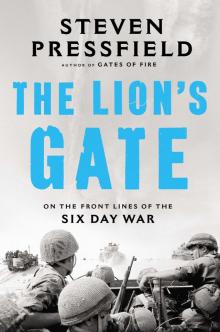 The Lion's Gate: On the Front Lines of the Six Day War
The Lion's Gate: On the Front Lines of the Six Day War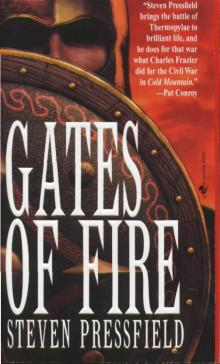 Gates of Fire
Gates of Fire The War of Art
The War of Art 36 Righteous Men
36 Righteous Men The Virtues of War
The Virtues of War The Afghan Campaign
The Afghan Campaign Killing Rommel
Killing Rommel Last of the Amazons Last of the Amazons Last of the Amazons
Last of the Amazons Last of the Amazons Last of the Amazons The Profession
The Profession Last of the Amazons
Last of the Amazons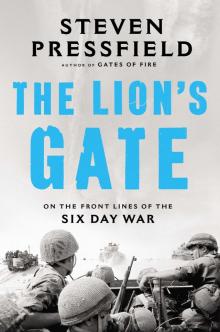 The Lion’s Gate
The Lion’s Gate The Legend of Bagger Vance
The Legend of Bagger Vance Virtues of War
Virtues of War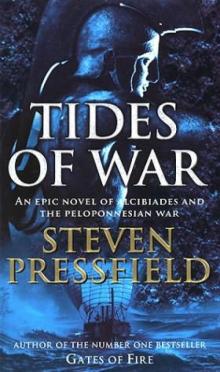 Tides of War, a Novel of Alcibiades and the Peloponnesian War
Tides of War, a Novel of Alcibiades and the Peloponnesian War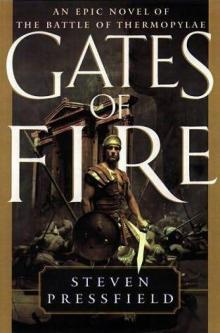 Gates of Fire: An Epic Novel of the Battle of Thermopylae
Gates of Fire: An Epic Novel of the Battle of Thermopylae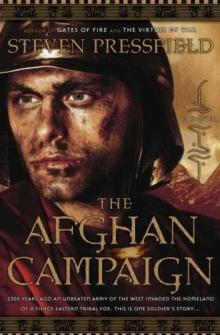 The Afgan Campaign
The Afgan Campaign